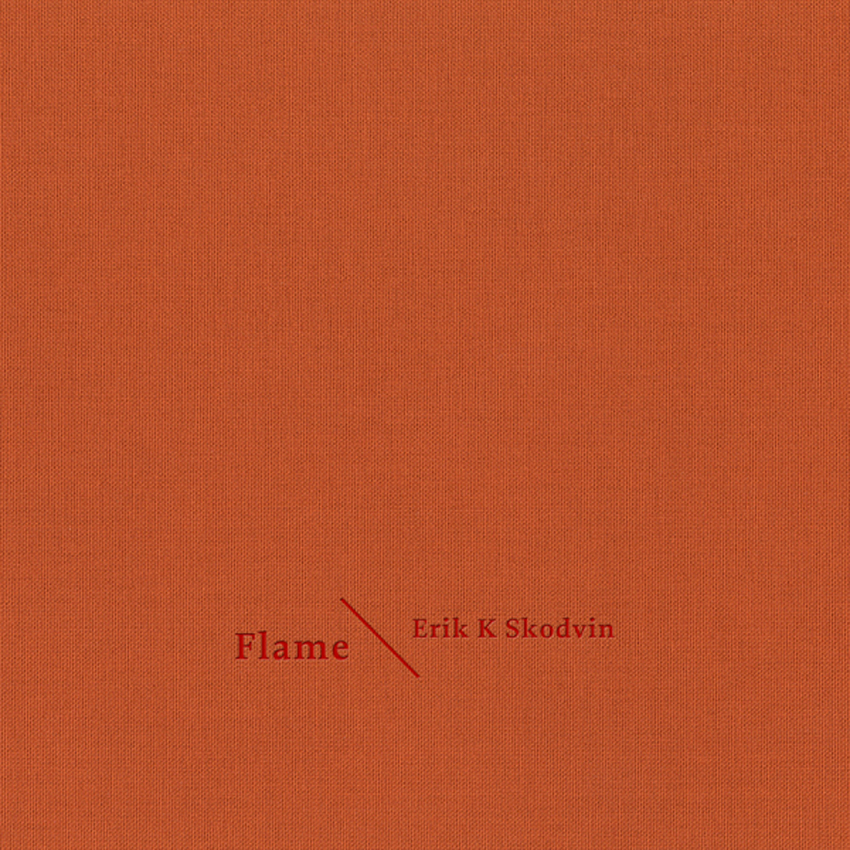 Flame is only Skodvin's second solo album under his own name (following 2010's Flare), but he has long been quite a prolific fellow in both his Svarte Greiner solo guise and as one-half of Deaf Center.  While I do not yet have a comprehensive command of Erik’s entire oeuvre, this latest effort seems like a significant detour from the bleakly heavy drones that I normally associate with him.  Flame is still dark, of course, but it is more of a gently smoldering darkness than a crushing, oppressive one.  More importantly, this is a wonderful album, as Skodvin's lighter touch, clarity, and increased use of space combine to bring his excellent ideas into sharp relief.
Flame is only Skodvin's second solo album under his own name (following 2010's Flare), but he has long been quite a prolific fellow in both his Svarte Greiner solo guise and as one-half of Deaf Center.  While I do not yet have a comprehensive command of Erik’s entire oeuvre, this latest effort seems like a significant detour from the bleakly heavy drones that I normally associate with him.  Flame is still dark, of course, but it is more of a gently smoldering darkness than a crushing, oppressive one.  More importantly, this is a wonderful album, as Skodvin's lighter touch, clarity, and increased use of space combine to bring his excellent ideas into sharp relief.
Flame is apparently the final installment in a two-part series of albums inspired by "nocturnal Americana" (Flare being the first part, naturally).  While that inspiration did not exactly jump out at me when I first heard the album, it makes a lot of sense in retrospect, though maybe Skodvin and I have differing definitions of "Americana."  At the very least, it explains the occasional blossoms of tormented-sounding blues guitar that sometimes surface.  In most other respects, however, there is nothing conventionally "Americana" about Flame at all, as it is largely a brooding mélange of eerily tinkling piano, dark and subtly dissonant string swells, and unconventional percussion.  The overall effect is quite a cinematic one, evoking flickering Lynchian images of black cars slowly creeping through deserted suburban streets in the dead of night.  Often the term "cinematic" is a polite code word for "music that does not quite stand on its own," but that is not the case here.  Flame creates its own images rather than seeming like a decontextualized part of a multimedia whole.
Admittedly, there are many other albums that sound like alternate soundtracks to Twin Peaks, Lost Highway, or Blue Velvet, but Flame is different, as it does not sound at all indebted to Angelo Badalamenti.  Rather, Skodvin has found his own neo-classical path to ominous and subtly hallucinatory nocturnal atmospheres.  While I certainly appreciate that originality, Flame's greatest asset is its execution: Skodvin and his collaborators (Anne Müller and Mika Posen on strings, Gareth Davis on clarinet) organically keep things at a menacing simmer without ever lapsing into static ambiance or blundering into heavy-handedness.  The best example of this mastery is "Reflections," as an eerie repeating piano motif twinkles with perfect rippling clarity amidst darkly massing strings, demanding (and deserving) my complete attention.  Also, Skodvin ingeniously keeps Flame lively with some surprisingly varied and wonderful percussion, like the oddly timed clapping/clacking rhythm in "Shining, Burning;" the lurching, hollow thump of "Black & Bronze;" and the buried metallic plinking of "Cypress Reverb."  Notably, however, the album highlight (the closing "Drowning, Whistling") works beautifully with no percussion at all, as its drones gradually build to an achingly beautiful crescendo of oscillating warmth with minimal accompaniment.
While there are admittedly a few songs that did not make a particularly strong impression on me, I ultimately loved Flame anyway.  It is refreshing and inspiring to hear something so nuanced, anachronistic, and meticulously crafted in today's musical landscape: this album is a feast of quiet power, attention to detail, appealing textures, well-used space, mood, and effective dynamics.  Also, I always appreciate it when someone crafts an album using people, wood, and steel rather than synthesizers and laptops, as it creates an appealing illusion of timelessness.  Equally importantly, this album was a huge surprise and I love surprises—I always knew that Erik was good, but never suspected that he was this good.  This is definitely one of the finest releases yet to come from the wonderfully aberrant Miasmah/Sonic Pieces milieu.
 
 
 
Read More

